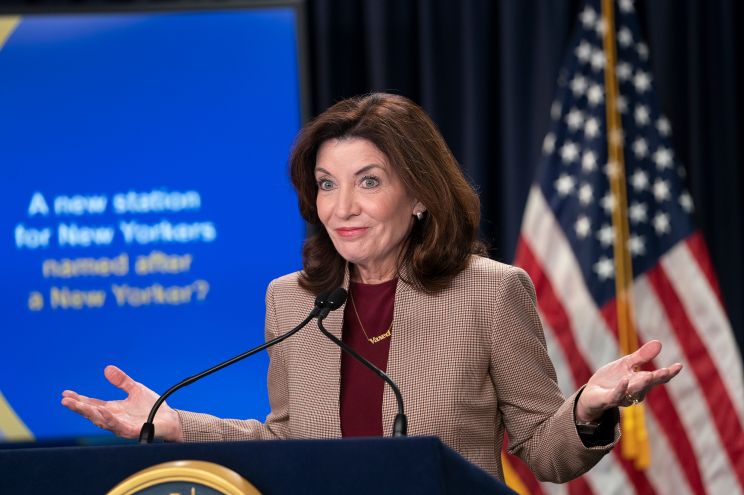Governor Kathy Hochul of New York, a representative of the Democratic Party, has drawn criticism after a comment insinuating that African-American children in the Bronx are unfamiliar with the concept of a ‘computer’. This statement was made last Monday at the Milken Institute Global Conference in California, during a panel discussion she was a part of, alongside Jonathan Capehart, an African-American journalist from MSNBC who steered the conversation. ‘There are young African-American kids growing up in the Bronx, imagine this, they don’t even know what a ‘computer’ is,’ Hochul said. ‘There’s this knowledge gap, and I want to help bridge that gap for them’.
New York Gov. Kathy Hochul (D): “Young Black kids growing up in the Bronx who don’t even know what the word ‘computer’ is”
— Real News Now (@RealNewsApp) May 7, 2024
This statement by Governor Hochul concerning the children of the Bronx, a substantial part of whom are African American, triggered a reaction from various political figures, including but not limited to her fellow Democrats from the Bronx. Among these figures was Bronx Assembly Member Amanda Septimo, who is associated with the Democratic party. Septimo was quick to express that the governor’s comments were ‘untruthful, overly generalized, and quite shocking,’.
In Septimo’s perspective, rehashing damaging stereotypes about an already marginalized community, without recognition of the entrenched institutional neglect these areas have experienced, is a pattern that only serves to fortify oppressive systems. ‘These sort of repeated comments, absent an acknowledgement of consistent state neglect, can only serve to emphasize and perpetuate systemic bias, is what I see it as,’ she mentioned in her statement.
In a similar vein, Assemblywoman Karine Reyes, who has been an enduring presence in the Bronx, voiced her discontentment with Hochul’s comments. Most particularly, what she perceived to be an ‘implicit bias’ towards children of color originating from the borough left her perturbed. ‘Our future, the children of our borough, are smart, incredibly adept, and deserving of every opportunity that is given to their peers,’ Reyes stated. Calling on Hochul, Reyes urged to improve: ‘We can, and should, do better’.
Lee Zeldin, who was previously a GOP congressman from New York, also weighed in on Hochul’s remarks. Having been a contender against Hochul in the election race of 2022, Zeldin drew attention to a statement from former collegiate swimmer Riley Gaines with an aim to showcase the perspective of those who were taken aback by Hochul’s comments.
In her social media post, Gaines unequivocally highlighted, ‘It’s underwhelming how disconnected our nation’s leaders seem to be.’ Without explicitly naming any political affiliation, she added ‘The facade is falling, revealing certain biases… If the people in majority black neighborhoods saw this video, it would resonate’ — a comment seemingly aimed at the Democratic party.
An unusual voice of criticism against Hochul came from Chaya Raichik. Raichik manages a widely followed social media account ‘Libs of TikTok’. In a post, she raised a profound question, ‘Why is there such a diminished view of African-Americans among certain demographics?’ Despite her veiled reference, it seemed to insinuate a critique towards the liberal ideology.
Texas Senator Ted Cruz, renowned Republican personality, also chimed in questioning, ‘Why the bias against African-Americans from certain quarters?’ He, much like Raichik, did not directly blame any single ideology or demographic, however, the nuance registered among those familiar with his conservative style.
Speaking on this situation, African-American Fox Business host Charles Payne said, ‘This sort of comment is disrespectful but somewhat expected.’ Though he left it at that, his brevity did not diminish the weight of his critique, indicating the strong sentiment against Hochul’s statement.
As the backlash grew, Governor Hochul felt it necessary to clarify her earlier statement. She released a follow-up, expressing her remorse over the pithy comments she had made at the conference. She explicitly stated that she had misspoken and regretted her choice of words in attempting to illustrate a broader point.
‘I regret the way I expressed myself, it was a misstep, and I am sorry for it’, she stated. Hochul was urgent to correct the misunderstanding that arose from her comments, stating, ‘Of course, the children in the Bronx are familiar with what computers are. The challenge lies in ensuring they have the requisite access to technology, to equip them for potential high-paying jobs in emerging industries such as AI.’
In admitting her mistake, Hochul recognized the importance of precision and empathy in her language as a political leader. She expressed her commitment to ensuring all children, especially those in underserved communities like the Bronx, have equal opportunities to thrive in society.
Despite the controversy, the conversation ignited a broader discussion about digital literacy, access to technology, and the responsibility of state governments to ensure all children have the resources to achieve their potential. Critiques of Hochul’s comments also underscored the danger of sweeping generalizations about particular communities or demographics.
While the incident served as a lesson on the pitfalls of casual comments, it reinforced the need for leaders to be ever-vigilant about the messages they convey. As the dust settles, it is hoped that Governor Hochul and others will be able to channel the criticism towards positive action that truly uplifts and empowers all children, regardless of their socio-economic background.


